Understanding the Link Between Suppressed Feelings and Outbursts
Emotional outbursts are sudden, often intense reactions that can seem to erupt without warning. A deeper understanding reveals that these reactions are frequently the result of underlying processes like emotional repression, especially common among men due to societal and cultural conditioning. This article explores how repressed emotions develop, their impact on mental and physical health, and strategies to manage them effectively.
The Foundations of Emotional Repression
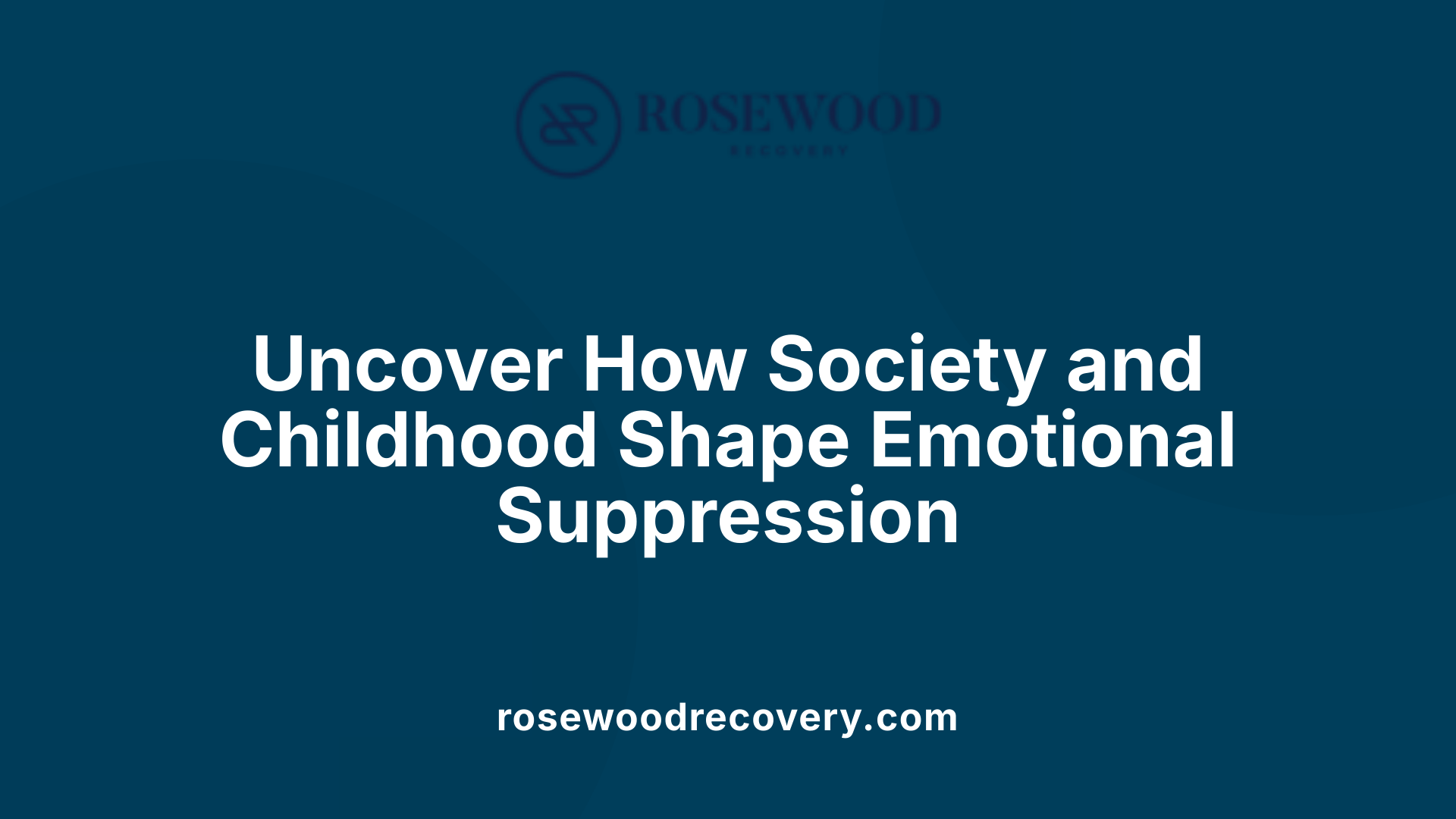
What causes emotional repression and how does it impact emotional reactions?
Emotional repression often begins in early childhood, influenced by environments that discourage vulnerable feelings such as sadness, fear, or insecurity. When children are told to 'man up' or are explicitly taught that certain emotions are unacceptable, they unconsciously learn to block these feelings to conform to societal standards. This early conditioning leads to a habitual disconnection from one’s genuine emotional experiences.
Societal pressures and cultural norms surrounding masculinity further reinforce these patterns. Men are often socialized to suppress emotions like fear and sadness, expressing only anger or stoicism. Such expectations create an internal barrier against emotional honesty, which over time becomes ingrained in their behavior and outlook.
Repression can also be a response to trauma or overwhelming circumstances, where avoiding painful feelings might serve as a defense mechanism. Whether conscious or unconscious, this process involves pushing difficult feelings into the subconscious to prevent emotional distress.
The consequences of emotional repression on reactions are significant. It heightens physiological stress responses, activating the sympathetic nervous system, which can cause physical symptoms such as headaches, muscle tension, and fatigue. Psychologically, suppressed emotions may manifest as numbness, irritability, or outbursts of anger and frustration when feelings eventually surface.
Long-term, repression can lead to serious health issues, including increased risks of heart disease, hypertension, anxiety, and depression. It also hampers emotional regulation and social connection, making it harder to communicate feelings effectively or maintain healthy relationships.
In summary, emotional repression—caused by early experiences, societal expectations, and conscious or unconscious efforts to avoid discomfort—diminishes the ability to respond adaptively to emotional stimuli. Addressing these underlying causes is essential for improving mental and physical well-being.
How Emotional Repression Affects Mental and Physical Health
What are the effects of emotional repression on mental health and emotional regulation?
Emotional repression often leads to serious mental health challenges. When feelings like sadness, anger, or fear are consciously or unconsciously suppressed, it hampers the ability to regulate emotions effectively. This can increase the risk of developing depression and anxiety disorders, as repressed emotions tend to accumulate, creating internal tension.
Chronic suppression of emotions also contributes to stress-related illnesses. Physiologically, repression triggers the body's stress response, elevating cortisol levels and increasing cardiovascular reactivity. This physiologic response raises the risk of heart disease and hypertension over time.
Beyond physical health, repression damages social relationships. It diminishes emotional closeness and trust, making it harder to connect with others and leading to feelings of isolation. Individuals might feel disconnected from their own needs and motivations, further impairing their capacity for healthy emotional regulation.
On an emotional level, repressing feelings blocks access to important internal cues. This lack of awareness can result in sudden outbursts or physical symptoms like headaches and muscle tension, as the body manifests unresolved emotional stress.
Practicing emotional acceptance—acknowledging and appropriately expressing feelings—has been shown to promote mental well-being. It enhances emotional regulation skills, strengthens relationships, and decreases physical health risks, highlighting the importance of healthy emotional processing for overall health and resilience.
| Aspect | Impact | Possible Consequences |
|---|---|---|
| Mental health | Increased risk of depression and anxiety | Internal tension, hopelessness, emotional burnout |
| Emotional regulation | Impaired regulation skills | Sudden outbursts, difficulty managing stress |
| Physical health | Heart disease, hypertension, immune suppression | Chronic stress effects, increased illness susceptibility |
| Social relationships | Reduced connection, trust, and support | Feelings of loneliness, relationship strain |
Addressing emotional repression through therapy, mindfulness, and open communication can significantly improve both mental and physical health, fostering healthier relationships and a more balanced emotional life.
The Long-term Consequences of Emotional Suppression
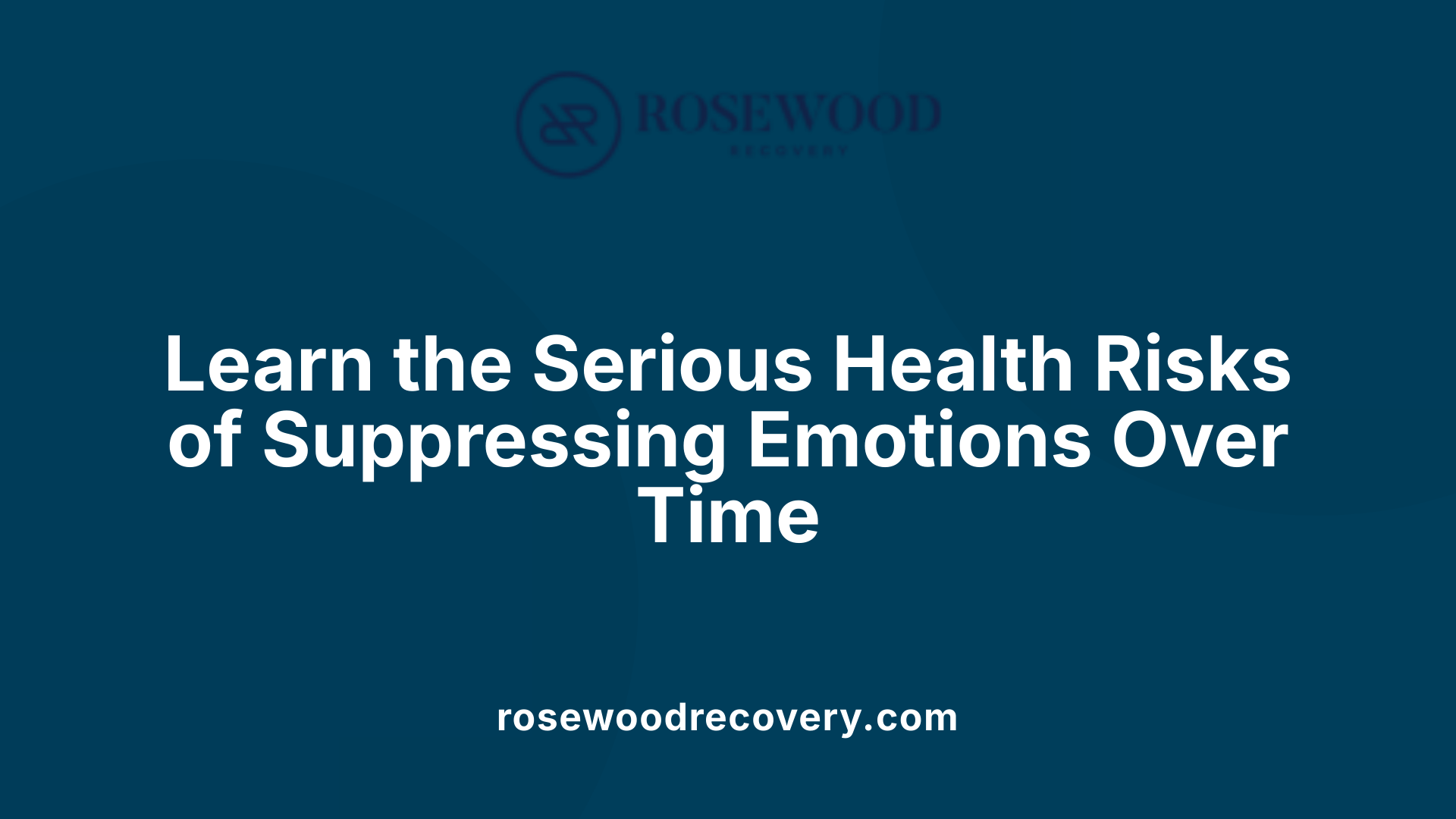
What are the consequences of long-term emotional suppression?
Long-term emotional suppression can significantly affect both physical and mental health. Physically, it increases the risk of heart disease, hypertension, and autoimmune disorders. Research has shown that chronic stress caused by suppressed emotions elevates cortisol levels, which can impair immune functions and contribute to conditions like autoimmune diseases, persistent headaches, muscle tension, and gastrointestinal problems.
Psychologically, persistent suppression is linked to higher incidences of depression and anxiety. The act of repressing emotions creates internal tension and chronic stress, which can lead to emotional numbness or, conversely, sudden outbursts when feelings become overwhelming. This ongoing internal conflict hampers emotional regulation capabilities, often resulting in feelings of disconnect from oneself and others.
The immune system is also affected, as chronic stress from emotional repression weakens immune responses, making individuals more susceptible to illnesses. Moreover, suppressed emotions hinder genuine social interactions, fostering feelings of loneliness, alienation, and emotional disconnection. This can strain relationships with partners, friends, and family, leading to misunderstandings and emotional distance.
Research suggests that sustained suppression might also increase aggressive behaviors and risk-taking, further deteriorating social ties. Over time, these effects culminate in a diminished quality of life, highlighting the importance of healthy emotional expression and regulation strategies.
In summary, long-term emotional suppression has broad and serious consequences, impacting physical health, mental well-being, and interpersonal relationships. Addressing these issues through emotional awareness, therapy, and open communication is crucial for maintaining overall health and well-being.
| Aspect | Impact | Additional Notes |
|---|---|---|
| Physical health risks | Heart disease, hypertension, autoimmune disorders | Elevated cortisol and stress responses undermine health |
| Psychological effects | Depression, anxiety, emotional numbness | Chronic stress creates internal tension and emotional disconnect |
| Immune system | Suppressed immune function, increased illness susceptibility | Stress-related immune decline can lead to frequent infections |
| Relationship difficulties | Emotional disconnect, loneliness, misunderstandings | Suppression hampers genuine intimacy and trust |
Understanding these long-term effects underscores the importance of expressing emotions healthily and seeking support when needed to safeguard both mental and physical health.
Differentiating Suppressed and Repressed Emotions
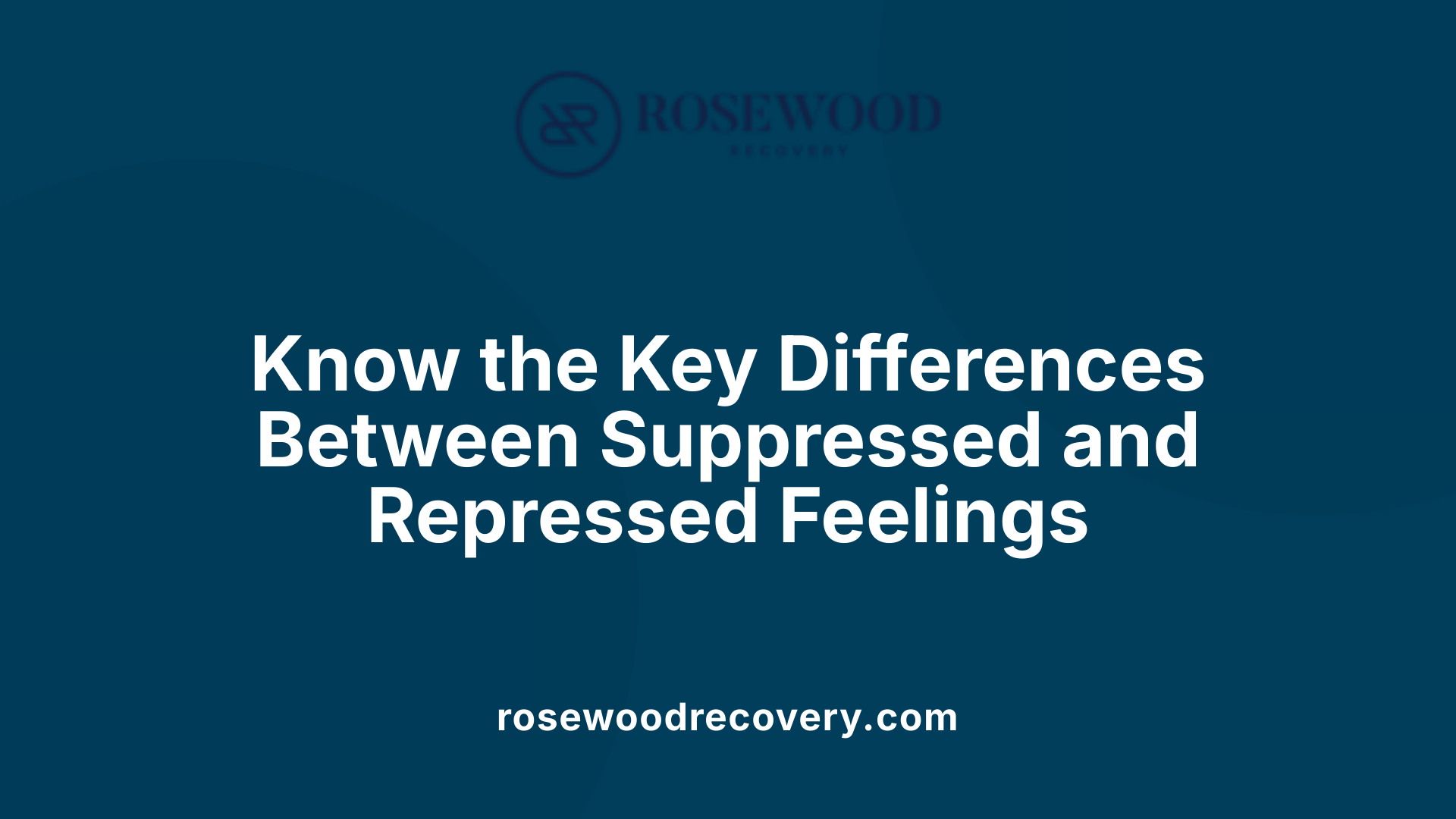
What is the difference between suppressed and repressed emotions?
Repressed emotions are feelings that have been unconsciously blocked or pushed out of conscious awareness, often as a defense mechanism to avoid pain or distress. These feelings are typically hidden without the individual’s conscious realization, resulting from deep-seated psychological defenses, trauma, or overwhelming experiences.
In contrast, suppressed emotions are those that a person consciously chooses to monitor, ignore, or hide temporarily. This deliberate effort is often aimed at managing intense feelings until a more appropriate time to address them. For example, someone might consciously suppress anger during a stressful meeting but be aware of the feeling beneath the surface.
The main distinction lies in awareness: repression is involuntary and occurs without conscious recognition, while suppression involves intentional control over emotional expression. Repressed feelings often manifest later through dreams, physical symptoms, or unexpected behaviors. Suppressed emotions tend to remain accessible in the mind but are actively avoided to prevent immediate discomfort.
Both unacknowledged and avoided emotions can have significant impacts on mental and physical health. Chronic repression has been linked to increased stress, cardiovascular problems, and mental health issues like depression. Meanwhile, suppression, if habitual and unexamined, can hinder emotional awareness and relationship satisfaction.
Understanding the difference is crucial for effective emotional regulation and mental health. Therapy and self-awareness exercises can help individuals process both repressed and suppressed emotions, promoting healthier ways of coping and greater emotional resilience.
The Causal Role of Repression in Emotional Outbursts
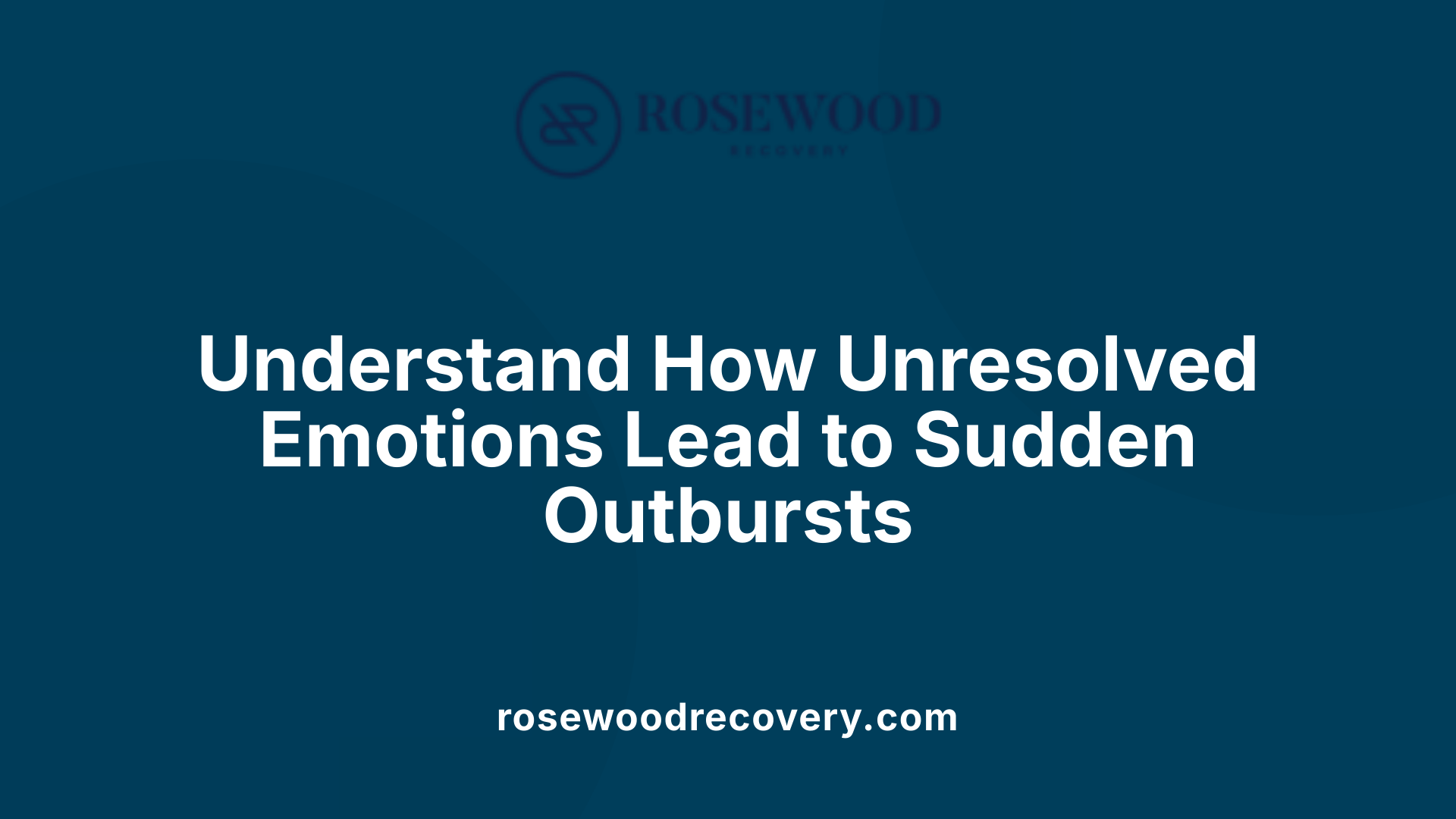
Can repressed emotions trigger sudden or intense emotional outbursts?
Yes, repressed emotions can indeed trigger sudden or intense emotional outbursts. When feelings such as anger, fear, or sadness are consistently suppressed or blocked, they tend to build up over time and may eventually explode unexpectedly.
This accumulation of unresolved feelings often results in emotional leakage, where these pent-up emotions surface abruptly and forcefully. Common manifestations include yelling, crying, impulsive actions like punching, or heightened irritability. Repression acts as a barrier to conscious emotional awareness, so the individual may not recognize the underlying cause until the outburst occurs.
Physical symptoms like headaches, muscle tension, and anxiety can accompany prolonged repression, further escalating stress levels. These internal pressures cannot be contained indefinitely and may burst out as emotional eruptions when the capacity to suppress them is overwhelmed.
In essence, the absence of healthy emotional regulation and failure to process underlying feelings create a volatile environment. Consequently, unresolved emotions not only cause internal distress but also manifest externally through intense, unpredictable outbursts, making repression a significant underlying factor.
Link Between Repression and Emotional Outbursts
How does emotional repression relate to emotional outbursts?
Emotional repression is an unconscious process where painful or socially unacceptable feelings are pushed out of awareness. This often occurs in response to societal messages or personal environments that discourage emotional expression, especially in men. When emotions are repressed, they don't simply vanish; instead, they accumulate inside as internal pressure.
This buildup of unresolved feelings can create a threshold that, once crossed, leads to sudden emotional explosions. These outbursts may manifest as anger, crying, yelling, or even physical acts like punching. They serve as involuntary releases of previously suppressed emotions that have been stored internally.
Chronic repression increases the internal stress load, which can, over time, result in physical health problems such as headaches, muscle tension, and cardiovascular issues. Mentally, it may lead to heightened levels of anxiety, depression, and burnout.
The connection between repression and outbursts exemplifies how unaddressed feelings do not simply disappear but can erupt unexpectedly when the built-up emotional pressure becomes overwhelming. Addressing repression through awareness, emotional expression, and professional support can help manage these sudden reactions, promoting better health and stronger relationships.
How do suppressed feelings release in explosive moments?
When emotions have been bottled up for a long time, they tend to surface rapidly when triggered. Common triggers could include perceived slights, stress, or reminders of past trauma.
This phenomenon explains why men who repress their feelings might suddenly explode after seemingly minor incidents. The release often appears disproportionate because it is not just about the immediate trigger but also about the accumulated tension from long-term suppression.
What is delayed or involuntary expression?
These emotional outbursts are typically delayed, occurring after weeks or months of repression, making them seem unprovoked or unpredictable. They are usually involuntary, reflecting the body's attempt to unburden itself of suppressed feelings.
How does stress buildup exert physical effects?
The physical impact of repressed emotions includes symptoms like headaches, gastrointestinal issues, muscle tension, and compromised immune function. The constant internal pressure places the body into a state of chronic stress, which over time can have serious health repercussions.
Overall, understanding the link between repression and emotional outbursts highlights the importance of healthy emotional regulation. Recognizing early signs of emotional buildup and seeking appropriate coping strategies, such as therapy, mindfulness, or open communication, can prevent harmful eruptions and promote mental and physical well-being.
Repression’s Role in Anger and Aggression
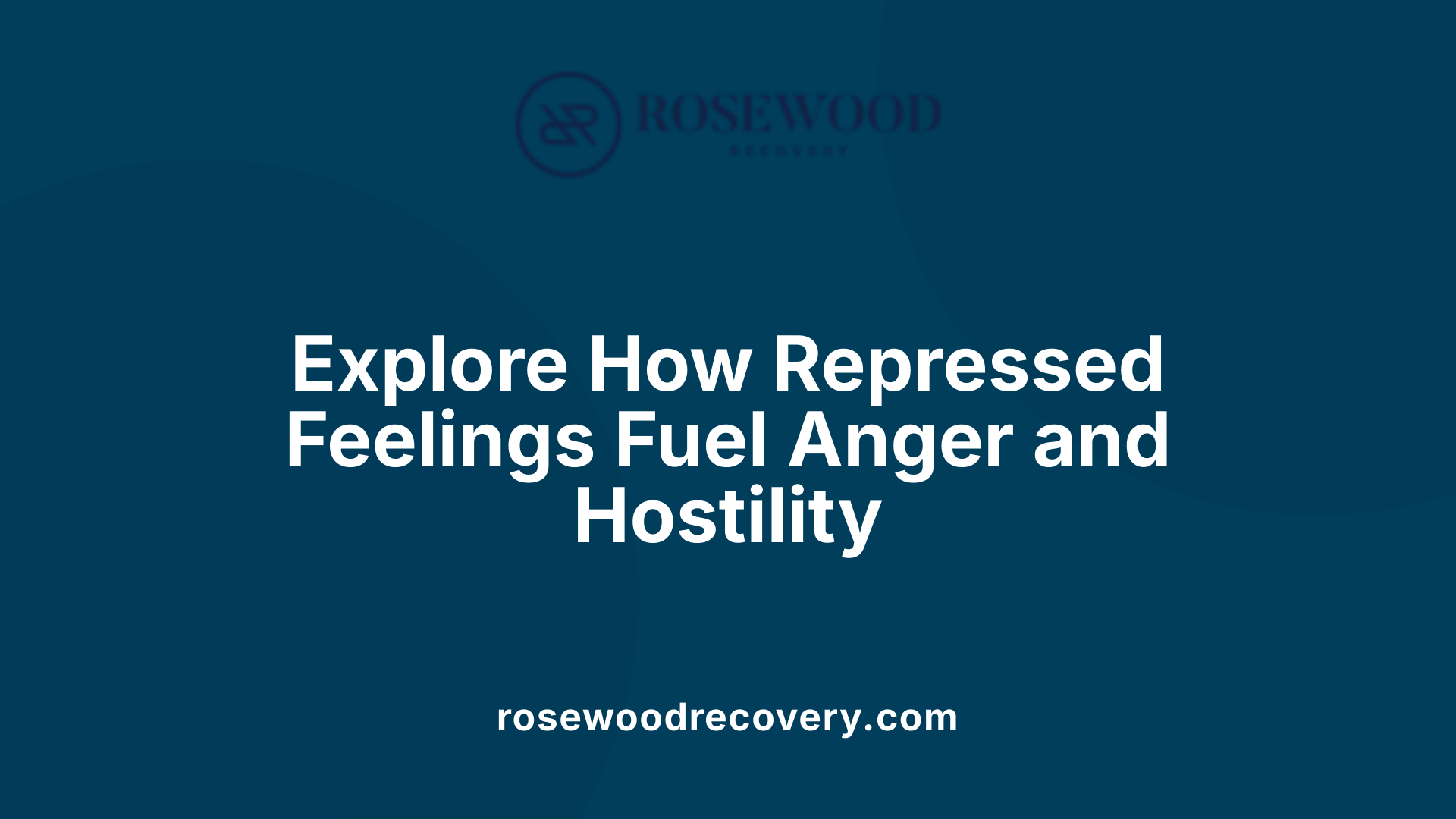
How do repressed emotions contribute to anger and aggression?
Repressed emotions, such as guilt, inadequacy, or frustration, often play a significant role in fueling anger and aggressive behaviors. When individuals unconsciously suppress these feelings, unresolved conflicts accumulate beneath the surface, creating internal tension that can eventually find an external outlet.
According to psychoanalytic theory, notably by Sigmund Freud, these hidden feelings reside in the unconscious part of the mind. They are not dealt with openly, which leads to internal unrest. When the conscience suppresses feelings of sadness, shame, or vulnerability, they can manifest as anger or hostility toward others or oneself.
This process frequently involves displacement, where the energy from repressed emotions is redirected onto less threatening targets, such as family members, colleagues, or even strangers. For example, someone who cannot confront feelings of inadequacy may lash out in frustration over trivial issues.
Biological and neural factors further influence this dynamic. The limbic system, particularly the amygdala, plays a key role in processing emotions like fear and anger. When these neural pathways are hyperactive—possibly because of repressed feelings—they can trigger impulsive and aggressive responses.
Hormonal influences are also crucial. Elevated testosterone levels have been associated with increased aggression, and stress hormones like cortisol can heighten emotional reactivity. These biological elements can intensify the tendency to act out when emotions are not consciously acknowledged or managed.
From a broader perspective, both unconscious emotional repression and innate biological mechanisms combine to shape aggressive expressions. Repressed feelings create unresolved internal conflicts, which, together with neural and hormonal predispositions, can lead to outward violent or hostile behaviors.
Understanding this complex interaction is essential for addressing issues of anger and violence, especially in contexts where emotional suppression is culturally reinforced, such as traditional notions of masculinity. Recognizing and working through repressed emotions can be a critical step toward reducing aggression and promoting healthier emotional expression.
Therapies and Strategies for Releasing Repressed Emotions
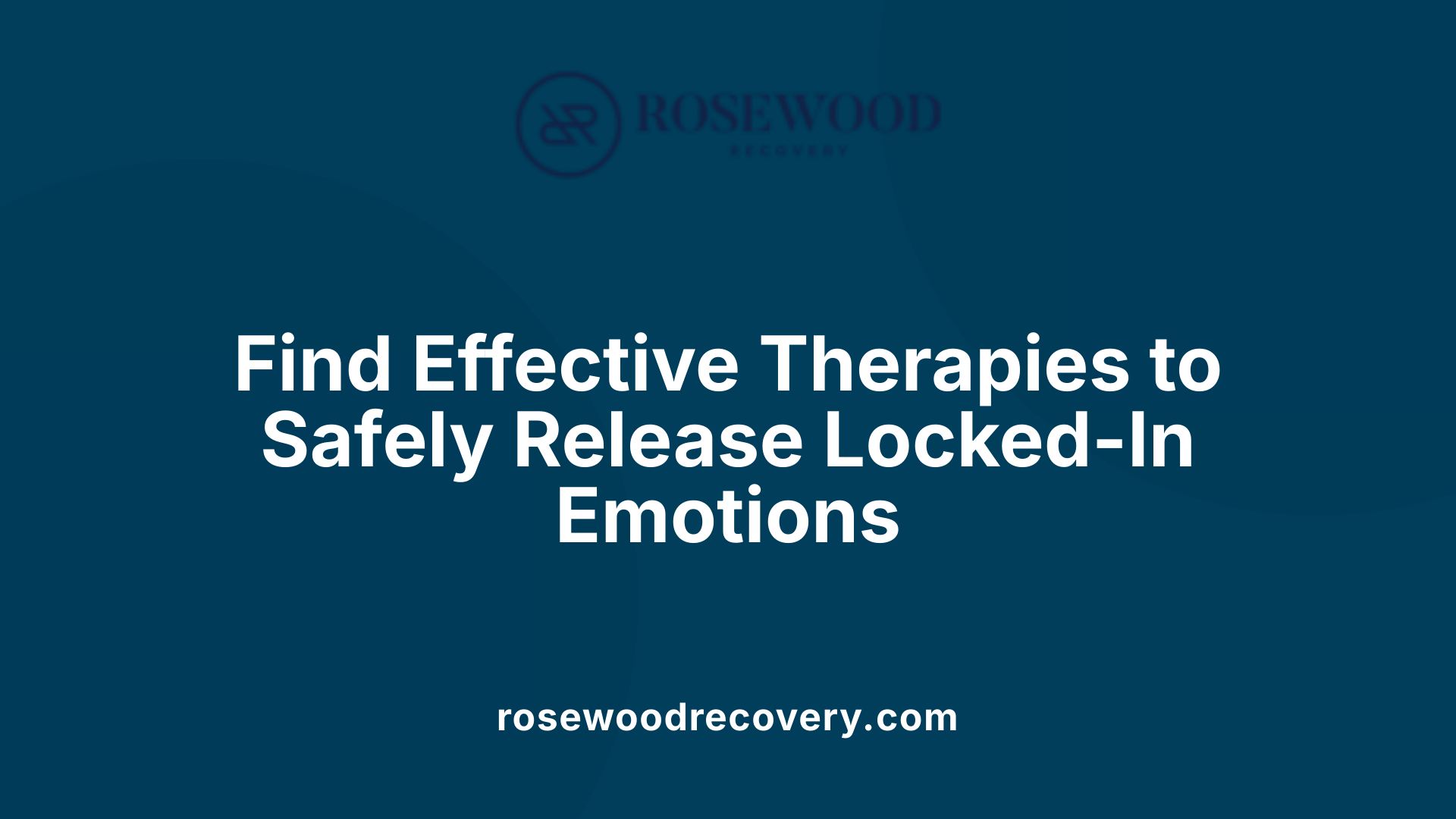
What therapies are effective for managing or healing repressed emotions?
Managing or healing repressed emotions often requires a combination of therapeutic approaches that guide individuals in safely exploring and expressing difficult feelings. Psychodynamic therapy is one of the most effective methods, as it delves into unconscious thoughts, memories, and early experiences to uncover hidden emotions. This deep exploration can help individuals become aware of feelings they may have long suppressed.
Cognitive-Behavioral Therapy (CBT) also plays a vital role by helping clients recognize patterns of emotional suppression and reframe negative thoughts linked to unprocessed feelings. This therapy emphasizes developing healthy emotional regulation strategies andAlternate ways of responding to distress.
For trauma-related repression, Eye Movement Desensitization and Reprocessing (EMDR) offers a special advantage. EMDR facilitates the safe processing of traumatic memories and can significantly reduce the emotional charge connected to past distress.
In addition to talk therapies, somatic practices and creative outlets provide alternative pathways for emotional release. Somatic therapies focus on bodily awareness, helping individuals notice physical sensations linked to repressed emotions and encouraging movement or respiration exercises to unlock emotional tension.
Creative therapies like art, music, or dance therapy serve as non-verbal channels for emotional expression. These methods can bypass conscious resistance, allowing feelings to surface naturally in a supportive environment.
Creating a safe space is crucial across all these strategies. A trusted therapist or facilitator helps individuals explore their feelings gradually, ensuring they do not feel overwhelmed or retraumatized.
In sum, these therapies—used alone or in combination—enable individuals to access, understand, and eventually release repressed emotions, fostering improved mental and physical health.
Detecting and Addressing Repressed Emotions Through Assessment and Practice
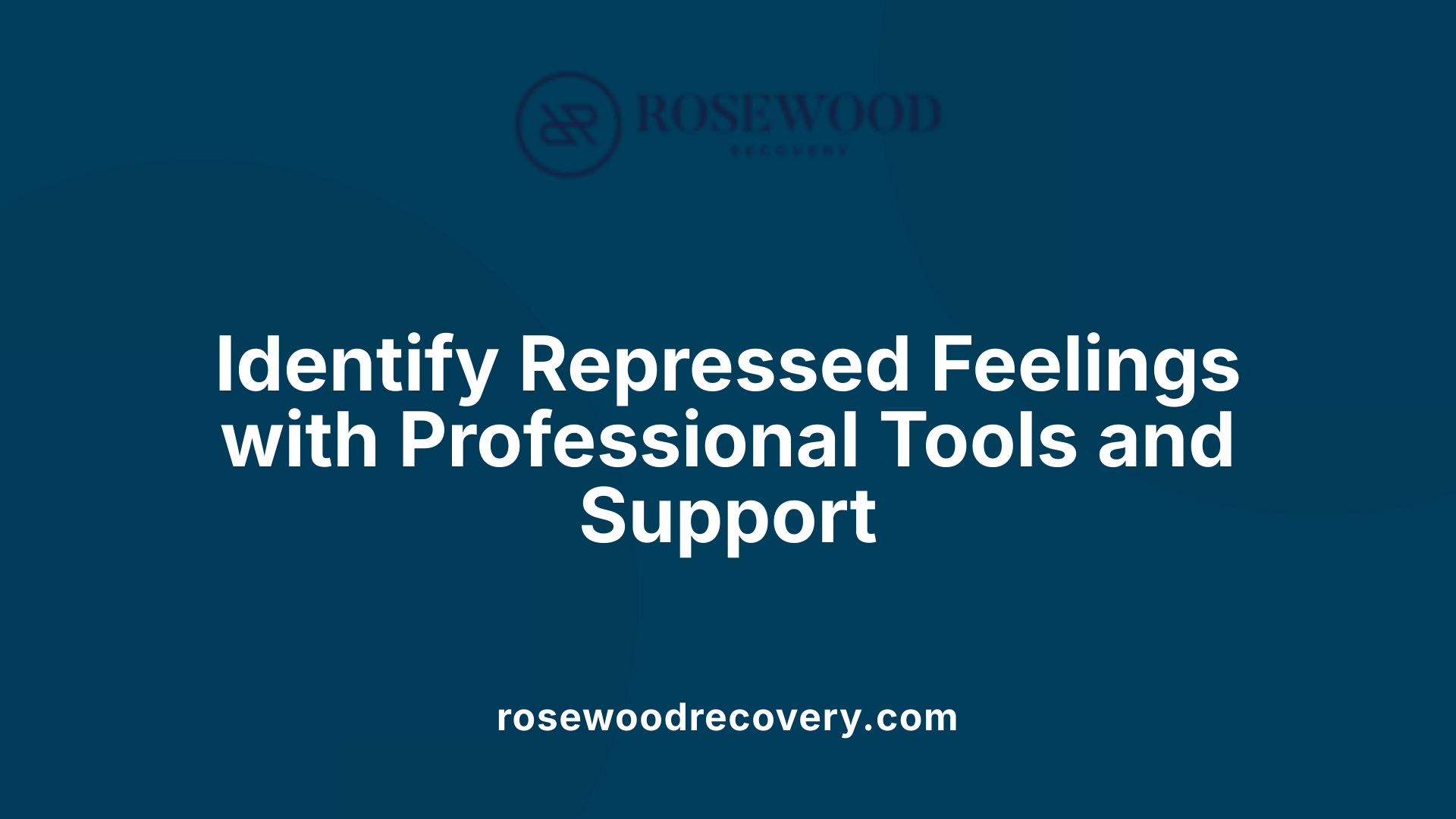
Are there tests to identify repressed emotions?
Currently, there are no specific standardized tests that are solely designed to directly detect repressed emotions. Instead, mental health professionals utilize a range of psychological assessments that can offer clues about unresolved or suppressed feelings.
Tools such as the Cognitive Error Review Questionnaire (CERQ), Difficulties in Emotion Regulation Scale (DERS), and Emotion Regulation Questionnaire (ERQ) are commonly used to evaluate how individuals manage and regulate their emotions. These assessments include brief questionnaires typically comprising around 20 questions, which can be completed within a few minutes.
While not diagnostic, these instruments provide valuable insights into emotional awareness and regulation skills. They can reveal tendencies toward suppression or difficulties in processing emotions, indirectly indicating possible repression.
However, it is important to remember that these assessments should be interpreted by qualified mental health professionals. They are part of a broader clinical picture and are not conclusive evidence of repressed emotions.
For those concerned about emotional repression, seeking guidance from a mental health expert ensures a comprehensive evaluation. A professional can incorporate these tools into a broader therapeutic process, helping to uncover underlying emotional issues and develop strategies for healthier emotional expression.
Understanding your emotional tendencies through these assessments can serve as a vital step toward emotional well-being. Combining assessment results with ongoing therapy and mindfulness practices can greatly aid in releasing repressed feelings and improving mental health.
| Assessment Tool | Purpose | Typical Questions | Indirect Indicator of Repression |
|---|---|---|---|
| CERQ | Evaluates cognitive responses to stress | Focus on thought patterns | Rigid, avoidance-focused thinking |
| DERS | Measures difficulties in emotion regulation | Emotion regulation challenges | Trouble managing intense feelings |
| ERQ | Assesses strategies of emotional control | Tendency to suppress or reappraise emotions | High suppression scores |
Understanding and utilizing these tools with professional guidance can significantly enhance your emotional awareness and overall health.
Toward a Healthier Emotional Life
Recognizing the connection between emotional repression and outbursts is crucial for fostering emotional health. Addressing repressed feelings through therapies, self-awareness practices, and societal change—such as redefining masculinity—can significantly reduce the likelihood of sudden emotional explosions. By learning to accept and regulate emotions healthily, individuals can enhance their mental well-being, improve relationships, and create a more authentic, emotionally resilient life. Emotional release is not merely about preventing outbursts; it is the foundation for mental peace, physical health, and deeper human connection.
References
- Emotional Outbursts in Men: Why Men Emotionally Repress
- Understanding Repression and How it Differs from Suppression
- The dangers of suppressing emotions | The CALDA Clinic
- The Social Costs of Emotional Suppression: A Prospective Study of ...
- Repressed emotions: Symptoms, causes, and release
- Suppressing Emotions Can Harm You—Here's What to Do Instead
- The Impact of Men Hiding Their Emotions - Mountain Valley Recovery

.jpeg)
.jpeg)

